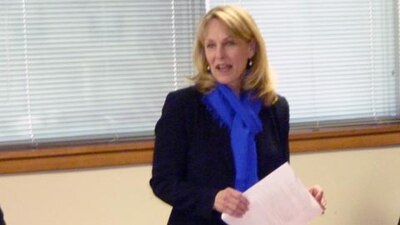Colorado’s experiment in crafting a new educator evaluation system kicked off Thursday with the first meeting of the 15-member Governor’s Council for Educator Effectiveness.
The council, created by Gov. Bill Ritter as part of the state’s Race to the Top application, is based on the premise that more effective and durable reforms can be achieved through a process representing a broad array of education interests, from the Colorado Education Association to administrators and from school board members to one lone student.
That approach stands in contrast to the more top-down way some other states have approached both the quest for federal education stimulus funds and the broader national push to improve teaching.
Thursday’s session, held at the Lowry headquarters of the state Community College System, was the usual first-meeting mix of introductions, setting expectations and deciding on a future meeting schedule.
The introductions gave some hints of how individual members are approaching the 18-month assignment.

“It’s always the adults who find it hardest to change.” – Lt. Gov. Barbara O’Brien, who welcomed the group but isn’t a member
“We shouldn’t be constrained by the past. … We’re not looking for a little tweak.” – chair Matt Smith
“My expectation is that we will be brave but cautious.” – CU education dean Lorrie Shepard
“My hope is to make a great system that is fair and equitable.” – Brighton teacher and union official Shelley Genereax
“Every time I think about this work I feel a weight upon my shoulders.” – vice chair Nina Lopez
The governor’s charge to the council is to develop a proposal under which teachers are:
- “Evaluated using multiple fair, transparent, timely, rigorous, and valid methods, at least 50 percent of which is determined by the academic growth of their students.
- “Afforded a meaningful opportunity to improve their effectiveness.
- “Provided the means to share effective practices with other educators statewide.”
The council has a Dec. 31 deadline to draft definitions of teacher and principal effectiveness and to “develop and recommend guidelines for adequate implementation of a high-quality educator evaluation system,” in the words of the executive order.
The order also sets a Sept. 30, 2011, deadline to make recommendations to the governor, legislature and State Board of Education on policy changes to:
- “Support districts’ use of evaluation data for decisions in areas such as compensation, promotion, retention, and removal, as well as the criteria for earning and retaining non-probationary status.
- “Ensure that the standards and criteria applicable to teacher and principal licensure and the accreditation of preparation programs are directly aligned with and support the preparation and licensure of effective educators.”
State education leaders have repeatedly acknowledged that despite a series of recent education reforms, Colorado is weakest in the area of educator effectiveness. The 2008 and 2009 legislative sessions passed important education reforms in the areas of standards, testing, P-20 alignment and school and district accountability. Last year lawmakers also approved creation of an educator identifier system that ultimately can be used to link teachers and principals with student achievement data.
There’s been debate in education circles about why Ritter chose to use an executive order rather than pursuing legislation this year. When he announced the council, Ritter pointed to some other states, which have been busy in recent months passing new laws to burnish their R2T applications. “That’s simply not how we go about school reform in this state. … Collaboration is essential to this process,” the governor said.
Colorado is one of 16 finalists for the first round of R2T grants, and the state’s application asks $605,000 to fund the work of the council, primarily for staffing.
Council member Kerrie Dallman asked, “Who’s going to pick up the slack?” if Colorado doesn’t win. Lopez said, “This work should be done regardless of the funding.” Ritter education advisor Liz Aybar said, “We’re in conversation with some other folks” about support. “Just rest assured that what you guys need will be taken care of.”
The group will meet again in April. The executive order expressly says that the council’s decisions are to be reached by consensus.
Council members
- Chair and at-large member: Matt Smith, vice-president of engineering, United Launch Alliance
- Vice chair and Department of Education representative: Nina Lopez, special assistant to the education commissioner
- Department of Higher Education: Lorrie Shepard, dean, School of Education, University of Colorado – Boulder
- Teachers: Shelly Genereax of Brighton School District 27J (also president of Brighton Education Association), Kerrie Dallman of Jefferson County Public Schools (also president of Jefferson County Education Association), Amie Baca-Oehlert of Adams District 12 (also an at-large Colorado Education Association director and union chief negotiator in his district), Nikkie Felix of Aurora Public Schools
- Public school administrators: Margaret Crespo, principal of John Evans Middle School in Weld County, Tracy Dorland, executive director of teacher effectiveness in Denver Public Schools
- Public school superintendent: Sandra Smyser, superintendent of Eagle County Schools, which has a pay-for-performance system and an evaluation system that includes student achievement
- School board members: Bill Bregar of Pueblo District 70, Jo Ann Baxter of Moffat County
- Charter schools: Colin Mullaney, principal of Cheyenne Mountain Charter in Colorado Springs
- Public school parent: Towanna Henderson of Denver Public Schools
- Student: Shelby Gonzales-Parker of Justice High School in Denver Public Schools, and a member of the student group Project VOYCE, which participated in drafting the state’s Race to the Top application
The council follows the classic Colorado “one-of-each” model for creating balanced commissions. Various members were selected with the advice of the following interest groups:
- Teachers – Colorado Education Association
- Administrators and superintendent – Colorado Association of School Executives
- School board members – Colorado Association of Schools Boards
- Charter representatives – Colorado League of Charter Schools
- Parent – Colorado PTA
